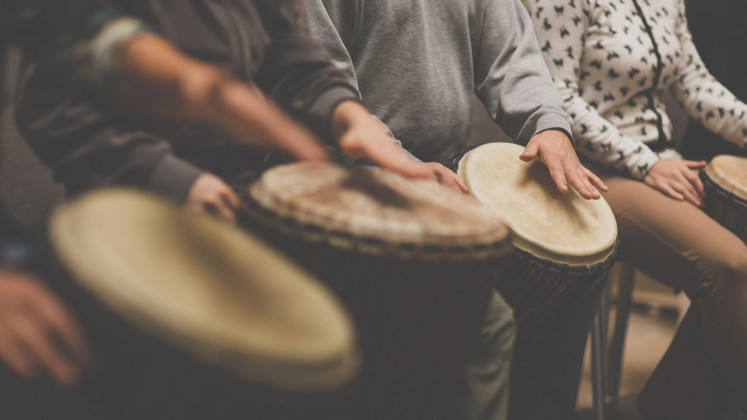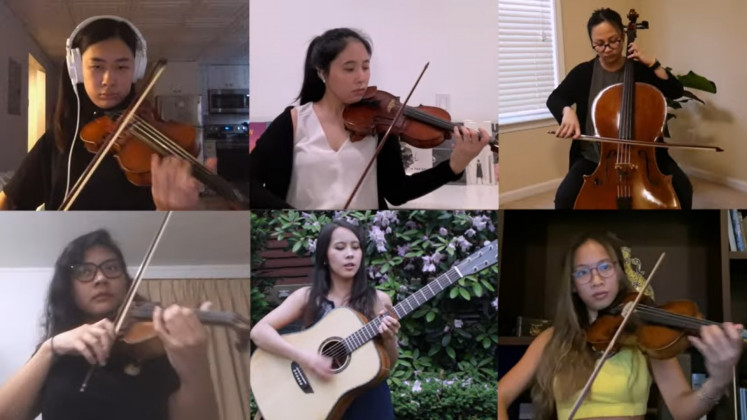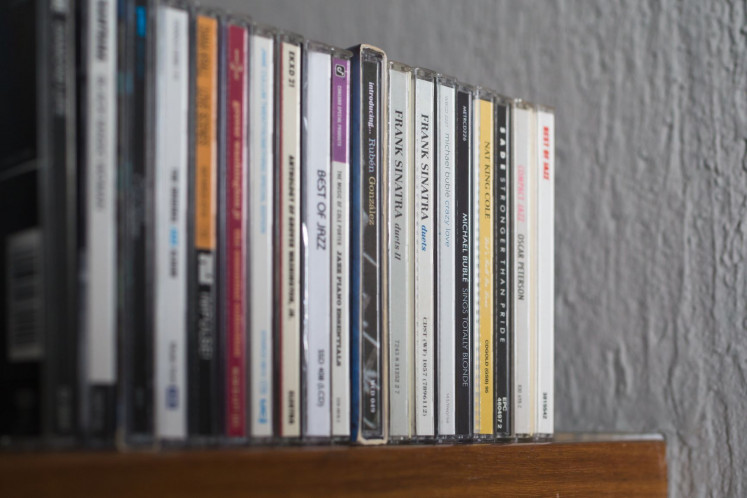Popular Reads
Top Results
Can't find what you're looking for?
View all search resultsPopular Reads
Top Results
Can't find what you're looking for?
View all search resultsMusic therapy offers respite, despite coronavirus reality
Fame and glory isn’t all it’s cut out to be for Indonesian multi-instrumentalist Laura Sekarputri, who is seeking to use her wide-ranging musical skills and talents to help others.
Change text size
Gift Premium Articles
to Anyone
“Vanity is ephemeral,” says the 24-year-old multi-instrumentalist, composer and music producer, who is pursuing a career as a music therapist in the United States, rather than as a world-renowned performer.
“I want to serve ‘the last, the lost and the least’,” says Laura Sekarputri, who is an accomplished player of the acoustic guitar, piano, electric bass and the Balinese gamelan.
Her chosen path is a reflection of the “unexpected clinical depression” she battled during her second semester at Berklee College of Music in Boston, which she graduated in 2018 with a major in music therapy and a minor in psychology.
“I hit rock bottom and had to take a gap year and return to Indonesia,” she recalls. “After five months of self-imposed isolation, my days took a turn for the better as I also discovered the benefits of music to regulate and lift my mood.”
Into music: A variety of musical instruments has also been invaluable in engaging clients of all musical backgrounds and preferences. (Courtesy of Shutterstock/l i g h t p o e t)Her personal experience has allowed Laura to be better at putting herself in her clients’ shoes.
Meanwhile, her familiarity with different musical genres and epochs – as well as her love for gospel, classical music, jazz and easy listening pop – has made her open and accommodating of her clients’ musical preferences.
Her ability to play a variety of musical instruments has also been invaluable in engaging clients of all musical backgrounds and preferences.
This is especially important when attending to people with mental disorders, the elderly and people with terminal illnesses.
Music in her soul: Laura (below, center) performs during ImpromToo’s “Over the Rainbox X Laskar Pelangi” with Indonesian alumni of the Berklee College of Music on her YouTube channel, Laura Sekar Music, as seen in this screenshot taken on Nov. 27, 2020. (Courtesy of YouTube/Laura Sekar Music)At the same time, she hasn’t entirely left her musical career behind, and founded ImpromToo in Boston. The pop band counts “Tiada” (Gone), which she wrote, among the songs it has produced. Most recently, she enlisted fellow Berklee Indonesians in her latest production, “Over the Rainbow X Laskar Pelangi”.
A standout during COVID-19, the West-meets-East medley created under her direction seamlessly juxtaposes Judy Garland’s rendition of “Over the Rainbow” (1939) and Indonesian rock band Nidji’s “Laskar Pelangi” (The Rainbow Troops, 2008). While the two are separated by almost seven decades, they are essentially variations on the ageless theme: hope for a better tomorrow.
This is basically what Laura tries to help instill in her patients so they are able to deal with their predicaments better, keeping in mind the biblical proverb, “A joyful heart is good medicine, but a crushed spirit dries up the bones.”
“A 10-year-old pediatric inpatient with a pain perception level of 9/10 after surgery got their pain level down to 1/10 at the end of a session with me,” Laura says, recounting one of her memorable successes as a music therapy intern.
She completed her internship at the Addison Gilbert Hospital, The Herrick House and the Ledgewood Rehabilitation & Nursing Center, all affiliates of Beverly Hospital, and at Seacoast Nursing & Rehabilitation Center.
Music therapists are ethically bound to protect the confidentiality of their clients’ identity and health condition – just like a clinical physician. They are also trained to provide therapeutic treatment for people with a variety of conditions: premature babies in neonatal intensive care units, people in a coma, people with terminal illnesses and survivors of sexual abuse as well as people with self-harm and suicidal behavior.
In this line of work, music therapists must quickly assess the client’s condition, the severity of their trauma and any possible threat to others. They then determine what kind of therapy will help them release suppressed or repressed emotions to effectively address their condition. This could involve therapeutic group singing or an individual session that incorporates songwriting and improvisation.
Revisiting memories, carefully: The classic ballads of legendary crooners can evoke a soothing mood for most people, but music therapists must exercise care and caution when using older music, as clients could have negative past associations that could counter their treatment. (Courtesy of Shutterstock/Roxane 134)Music therapists must act with extreme caution when using older music, which might bring back invasive or unpleasant memories. They must also be sensitive to their client’s race, religion, age, sex, sexual orientation, gender identity or expression and socioeconomic status, as well as any disabilities or preexisting health conditions, to name but a few.
And even as they try to establish rapport with their clients, music therapists must also take care to remain objective and have self-defense strategies in place to deal with the unexpected, such as unwelcome sexual advances.
One personal challenge Laura is facing is in improving her own vocal skills.
“[...] Most of the time, my clients will sing together with me, so I have to sing in tune with a pleasing quality and adequate volume, either a cappella or with the accompaniment of a guitar, piano or percussion instrument,” she says.
Laura’s current plans are to continue developing her skills through further study in the US, although she says “it's hard to expand the programs in different departments, even in prestigious hospitals, because many music therapy programs are still heavily funded by donors”.
Asked about any instances in which music therapy might not work, she replied that music therapy might not be suitable for people who hated music.
However, she believes that when used skillfully, music can facilitate emotional release and provide a supportive environment for clients to develop healthy coping skills – even people with impaired hearing.
“Even if the client is deaf and mute, drums can still be used, as they can still feel the vibrations,” she says, concluding with a quote from one of her favorite composers, Leonard Bernstein: “‘Music can name the unnameable and communicate the unknowable’.” (ste)














